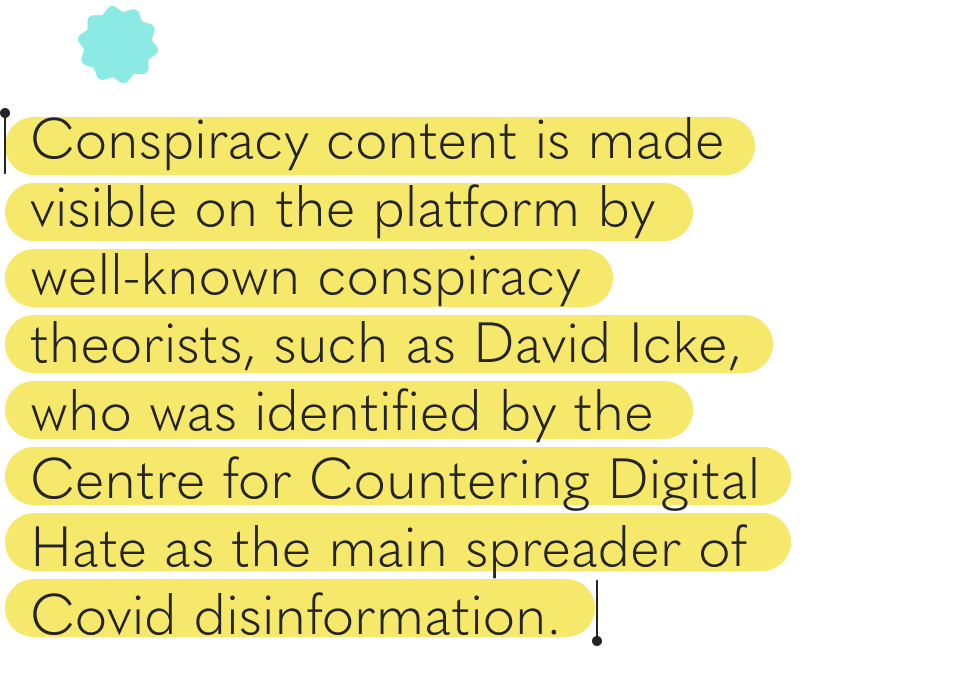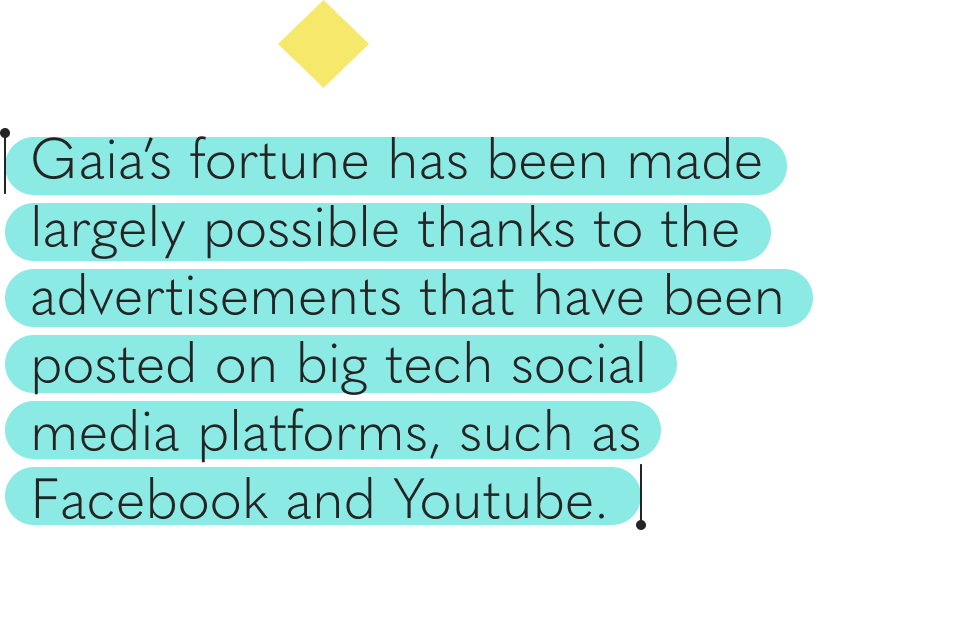
Welcome to the Financial Fairy Tales, in this book we are diving into the business behind disinformation, by revealing the mechanisms that bring individual actors and social media platforms to benefit themselves.
Have you heard about the “nearly magical” alternative treatments for the coronavirus? Or about the ‘Brain Force Plus’, which promises to “supercharge” cognitive functions? The contents of these are designed to attract our attention as consumers.
The list is long and can quickly jump from ‘harmless’ wellness products to real conspiracy theories: ranging from the docuseries on ‘The Truth about the Vaccines’ to the book on ‘The Truth of COVID-19’, these are all products that fuel and financially support the Disinformation Industry.
Thanks to the internet, and particularly social media platforms, conspiracy theories are a profitable business.
They have allowed disinformation entrepreneurs to attract a wide audience of followers. How do they do so? By following these steps:
Social media platforms have also profited directly from false content. According to the Global Disinformation Index, ads running on just 500 disinformation websites in 2020 generated $25.1 million in revenue, with 95% of revenue coming from Google, OpenX and Amazon.
Misinformation produces a huge amount of engagement and ‘clickbait’. For example, a report revealed that Facebook and Instagram attracted 37.8 million anti-vaxxer followers during the pandemic, making Facebook earn up to $1.1 billion in revenue.
Mainstream social media platforms have a huge influence on the information environment. So be aware of any exciting content you might see on the internet. Fabricated stories are designed to pray on our emotions and gut reactions so it is important to equip yourself with a critical approach. Let’s dive into some of the disinformation entrepreneurs that have made their lies into a profitable business.
Alex Jones is the founder of a conservative radio show and Infowars, an influential far-right conspiracy theory website. He is a well-known catalyst of any newsworthy tragedy, spreading conspiracy ideas that large-scale events are engineered with malicious intentions.
One of the most recent examples is the Sandy Hook case, the massacre led by a gunman who shot and killed 26 people in 2012, 20 of which were children between 6 and 7 years old. For years, Infowars spread falsehoods around the fact that the tragedy was made up and the families of the victims were liars. The lies of Infowars caused offline harm: families of the victims received death threats and harassment. In October 2022, a jury ordered Mr. Jones to pay almost $2 billion dollars for the emotional damages he caused to the relatives of the families. But who funds such conspiracy theories and who profits from them?
Although Infowars is a private company and its financial results are not reported publicly, we know from a report by the New York Times that the main revenue of Infowars comes from expensive dietary supplements, with a profit of tens of millions of dollars per year.
What is worth mentioning is that Infowars dietary supplements are not just health items, but provide a path to funding Jones’ extreme conspiracy causes. In his radio show, Alex Jones makes it clear that his online storefront represents a means to support his political agenda. Those are his words: “We also need funding - more funding than ever because I want to expand. There's a lot of people that need my help. So buy the products. You need them anyways. Vitamin Mineral Fusion back in stock - 50% off, free shipping still. Alpha Power is sold out”.
The Infowars Store sells wellness products that claim to improve health conditions. At the beginning of the pandemic, Jones had been advertising treatments, such as colloidal silver products, to prevent COVID-19 infection. The Food and Drug Administration declared the lack of safety over these products in treating COVID-19 and urged Jones to stop making false claims about it. Another interesting example is the snake-oil supplements sale, which claims to “supercharge cognitive functions” and “stabilise your vitality.” However, an independent testing lab revealed that it contains regular iodine sold at a tripled price compared to its real value.
As the popularity of Alex Jones has grown over the years, as has Infowars’ merchandising. While Jones was banned by several social media platforms - Facebook, Youtube, and Twitter - for violating policies against hate speech, he is still able to advertise his products on one of the biggest e-commerce platforms: Amazon. In return, Amazon gets a percentage of the sales - the so-called referral fee. When products are worth more than 10$, Amazon's profit is 15%. It is unclear how much of the sales come through Amazon, but it is undeniable that the biggest online retailers make a huge profit from it.
Therefore, it looks like Amazon, among other social media platforms, is lacking a firm policy when it comes to selling misleading products that finance conspiracy ideas or allegedly “cure” COVID-19, while still making a profit from it.
Gaia originally started as a yoga streaming platform. Nowadays, it defines itself as “the largest online resource of consciousness-expanding videos”. Gaia's case is worth mentioning because aside from videos on yoga and spiritual healing, it offers hundreds of unreliable sources related to aliens, alternative history content, and alternative medicine.
Within this context, Gaia has pushed several conspiracy theories: from Antisemitic theories about Jews controlling the world to anti-vax disinformation. Interestingly, the platform attracted several QAnon believers who are also part of the yoga-lover community.
For example, one certified user of Gaia is Krystal Tini, a lifestyle influencer and yoga teacher known to post videos in support of QAnon. Conspiracy content is made visible on the platform by well-known conspiracy theorists, such as David Icke, who was identified by the Centre for Countering Digital Hate (CCDH) as the main spreader of Covid disinformation. In 2021, the website reached a revenue of $80.000 thanks to its 800.000 paid subscribers across 185 countries.
Gaia’s fortune has been made largely possible thanks to the advertisements that have been posted on big tech social media platforms, such as Facebook and Youtube. While those social media platforms have been claimed to ban COVID-19 misinformation, they are still exposing and profiting from this content by allowing Gaia’s advertisements to be displayed.
Throughout the COVID-19 pandemic, public health authorities advised vaccination as the most effective measure to limit the spread of the virus. Nevertheless, anti-vax communities saw these times as an opportunity to attract an audience and spread misinformation regarding the safety of vaccines.
Social media companies, such as Facebook and Youtube, were responsible for allowing dangerous misinformation to be broadcasted on their platforms and contributed to anti-vaxxers ability to obtain a wide range of ‘customers’.
Since the beginning of the pandemic, 147 of the most popular anti-vax accounts have increased by 25% in their followers. The anti-vax community has reached 62 million followers across social media platforms, 31 million of which are only on Facebook. This huge popularity allowed both groups to profit.
According to the CCDH, it is estimated that anti-vaxxers' followers are worth $1.1 billion in annual revenue to Facebook. This is made possible by advertisements paid by anti-vax movements aimed at spreading anti-vax misinformation widely, as well as advertisers who target users with an interest in anti-vax content. In return, the Anti-vax Industry boasts revenue of at least $37 million thanks to merchandising and crowdfunding.
The CCDH profiled twelve leading anti-vax figures with a combined following of 13.6 million. They have been selected for their influential role in spreading paid misinformation on social media platforms. The report showed that these so-called ‘disinformation dozen’ are responsible for 70% of the anti-vax content that was analysed on Facebook.
Most importantly, these leading figures were able to enrich themselves widely by spreading anti-vax misinformation, most of the time by providing their customers with paid content or products, ranging from books to dietary supplements.
It is known that Facebook has been used as a ‘marketing funnel’ to direct their customers from social media content to newsletter sign-up until paid content or products.
For example, Joseph Mercola, one of the most dominant anti-vax entrepreneurs, owns a network of alternative health companies. His wealth allowed him to give more than $3.3 million in donations to anti-vaccine organisations, including the National Vaccine Information Centre (NVIC), which, despite its name, is actually the leading source of fear mongering and misinformation about vaccines.
Social media platforms failed in taking action against health and anti-vax misinformation and contributed to increasing vaccine hesitancy among the population. This poses a threat to public health and undermines vaccines as the most effective way to limit the spread of the virus. This failure resulted from a deliberate business model that made big tech companies benefit directly from anti-vax content.
Conspiracies are created to prey on your emotions, like we have seen in the Conspiracy Cookbook. Those who spread these stories often hope they will be amplified all over the world, following the steps from the Amplification Atlas. Sometimes this is for personal gain, other times, the Financial Fairy tales they create are for profit…
In the end, people are being used as a tool, as a weapon for someone else's benefits. Find out how easy it is by playing this quick game!
By unravelling their fairy tales, you are on a quest to dismantle their profit-grabbing businesses, so they won't like it! It is important to protect yourself from any backlash. You can do this by following the yellow-brick-road to get back home to safety.
• Google yourself! How available is my personal information? Are you okay with this? There is always the right to be forgotten
• Use a VPN or Tor browser
• Check your privacy settings
• Use two factor identification & different passwords for your accounts
• Familiarise yourself with reporting tools
• Use anonymous accounts if possible
• Do not leave your notifications on at all times
• Make sure you have support from people on the same platform you are using
• Take breaks! Make sure you spend enough time doing other activities
• Block trolls
• Avoid doom scrolling
• Report threats immediately
• Change all your passwords if attacked
• Do not respond to personal attacks (Don’t feed the trolls)
• Make screenshots and create an incident log
• Find support, share your experiences























